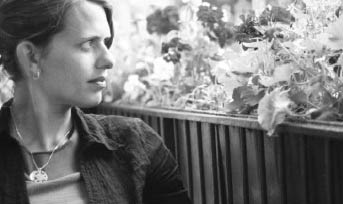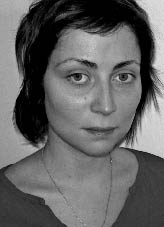Next story: Definitely Not the Senecas: Christmas in the Clouds
Culture Workers United
by Michael Kelleher

For those readers unfamiliar with the landscape of poetry publishing, here’s a quick fact: most poetry published in America today is printed by small, not-for-profit presses, most of which are run by one or two people, most of whom operate out of their homes and make little or no money for their efforts. This kind of behavior has come to be known as “culture work,” which, loosely translated, means: work done for the love and fun of the art it serves. Members of the Brooklyn small press collective Ugly Duckling Presse (UDP) are culture workers in the best sense of that term. That is, they love what they do, they do it for fun and they do it well.
Founded as a Dada and Samizdat-influenced zine by Matvei Yankelevich in 1993, UDP has developed over the past 13 years into a collective of writers, poets and artists all dedicated in equal measure to its collective editorial structure and its uniquely diverse publishing agenda. This agenda includes, or has included, an Easter European Poets Series; 6 x 6, a magazine which publishes six pages each of six poets at a time; Emergency Gazette, a bi-weekly broadsheet of theater writing as well as a broad range of books, chapbooks and electronic publications.
Collectives have a tendency to fail, and they can do so in a spectacular number of ways. In some cases, personality conflicts among members lead to a splitting into factions. In others, the lack of a strong center leads to apathy and dissolution. In still others, a common ideological drive leads to stifling uniformity that chokes the collective will. Given both the high hopes collectives embody and the number of ways in which they can dissolve, it is remarkable that UDP has lasted this long and has continued to produce such high-quality books.

I recently conducted an e-mail interview with three members of the collective: poets Anna Moschovakis, Matvei Yankelevich and Genya Turovskaya, who will be reading tonight (Feb. 16) at Big Orbit Gallery.
Genya Turovskaya, an editor for (and writer published by) the Eastern European Poets Series of UDP, was born in Kiev, Ukraine and moved to New York at the age of six. In addition to her own work, Turovskaya has done quite a bit of translation, including a book-length project of the Russian poet Arkadii Dragomoshchenko on which she is currently working. Anna Moschovakis hails from Los Angeles, where she was active in theater and film. Moschovakis also translates text, in this case from French. Yankelevich, another collectiviste of Russian descent, claims a wide variety of interests and influences, including avant-garde and improvisational music (he took courses in college with Anthony Braxton), as well as experimental theater.
In interviewing the three of them, I found three distinct personalities linked together by a shared desire to make good books and a down-to-earth understanding of the “work” required in “culture work.” I asked them about the collective itself and why it seems to work, to which they, collectively, replied:
“The collective editorial structure of UDP is, in a word, unstructured. During the period of growing pains after we went ‘official’ (meaning: became a nonprofit, parenthesis mine) and began receiving (some) funding from grants, contributions and subscriptions, we tried several times to codify the procedure for project selection, but in the end, we seem to have settled into a quasi-organic mode of collaborative chaos. Basically, if any single editor is passionate about a project, as long as he or she can take charge of funding and producing that project, the rest of us do our best to help it along. We rarely veto each other’s selections, although it helps, when we’re on the fence about something, to have so many strong and often divergent tastes. Some of the sub-projects—such as the Eastern European Poets Series, the new Lost Literature Series, or 6 x 6—have two or three editors who act pretty much independently from the rest of the collective, but who require more unanimity between themselves.”

Perhaps it’s a shared idea of work that brings this collective together. In a digital age, they make at least part of each book by hand, a laborious, time-consuming process, which results in books that are neither perfect nor uniform in appearance. I asked about their work process:
“Each UDP production is different. Chapbooks usually have letter-pressed covers and laser-printed guts and are bound by an army of volunteers using awls, thread, hole punches, power drills, twine, duct tape, rubber bands, ribbon, metal brads, etc…(sometimes even staples). Our perfect-bound books are sent electronically to a bindery in Michigan, but we usually print the covers in our workshop on the letterpress.”
When I asked Yankelevich if he thinks of UDP as an extension of his writing practice, he wrote back an affirmative, “YES!” “For me, UDP has always been an art project, and a political project,” Yankelevich says. “I wanted to find an alternative way of publishing, keeping a kind of Samizdat approach to counter ‘official’ publications…Also, working in a collective—one that’s constantly changing and growing, where new people and ideas are always coming in—is more important than my work as a singular individual artist, because that model of operation seems old and tired to me.” Similarly, for Turovskaya, her interest in contemporary Eastern European poetry, translation and bicultural experience made editing for the Eastern European Poets seem a natural extension of her writing practice.
Moschovakis, however, sees the collective and her writing as distinct, if related, enterprises. “I don’t really see UDP as an extension of my writing practice any more than the other parts of my life are, like teaching or translating or having a part-time day job. The Presse for me is really about collaboration and about the power of numbers when it comes to achieving seemingly impossible ends.”
|
Issue Navigation> Issue Index > v5n7: Hard Knocks (2/16/06) > Culture Workers United This Week's Issue • Artvoice Daily • Artvoice TV • Events Calendar • Classifieds |









 Current Issue
Current Issue